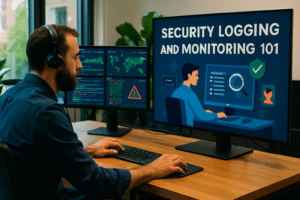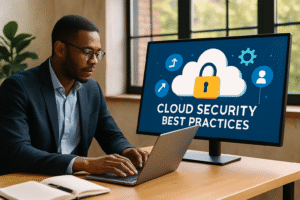
Why cybersecurity matters for everyone
In a world where our digital and physical realities intertwine more each day, cybersecurity is no longer a concern reserved for IT professionals or large corporations. It has become a vital aspect of everyday life for individuals, families, students, and workers in all fields. Understanding the significance of cybersecurity is fundamental for anyone who interacts with the digital world—which, now, means practically everyone.
The Digital Footprint: Invisible but Indelible
Every time you send an email, shop online, or even just browse social media, you leave behind a digital footprint. This trail of data can be harmless, but it can also become a target for those with malicious intent. Our digital lives are intricately recorded, often in ways we are not even aware of. It’s not just about what you post or share, but also what is collected passively in the background.
The reality is: if you’re online, you’re exposed. The question is not whether your data is valuable—it’s how valuable it is to someone else.
Cybersecurity helps protect this digital footprint, ensuring that your personal information, financial details, and even your identity are not easily exploited. As more devices connect to the internet, from smart homes to wearable tech, the attack surface grows, making basic cyber hygiene essential for everyone, regardless of technical expertise.
Personal and Social Consequences of Poor Cybersecurity
Many people underestimate the impact of cybersecurity threats, believing themselves too insignificant to be targeted. However, the reality is that cybercriminals often rely on this false sense of security.
Identity Theft and Financial Loss
One of the most direct threats to individuals is identity theft. By gaining access to your personal details, attackers can open bank accounts, obtain credit cards, or even commit crimes in your name. The financial consequences can be devastating, but so too can the emotional toll of reclaiming your identity.
Data Privacy and Mental Health
When private information is leaked or stolen, it isn’t just about money. The breach of privacy can lead to anxiety, stress, and in some cases, harassment. For neurodivergent individuals—those with ADHD, autism, dyslexia, and other neurological differences—these attacks can be even more overwhelming, as the effort required to recover and manage the aftermath can be particularly taxing.
Cybersecurity isn’t just about protecting data; it’s about preserving dignity, autonomy, and peace of mind.
Cybersecurity in the Context of Women and Underrepresented Groups
Women and other underrepresented groups in technology face unique challenges when it comes to cybersecurity. Online harassment, doxxing, and targeted attacks are unfortunately common, with potentially severe personal and professional consequences. Empowering women and marginalized communities with cybersecurity knowledge is a crucial step toward digital equality.
Moreover, the tech industry needs diverse perspectives to build more secure systems. Women and neurodivergent individuals bring invaluable insights to cybersecurity, from threat modeling to user experience. Cultivating their participation not only benefits individuals but strengthens the entire digital ecosystem.
The Evolving Threat Landscape
Cyber threats are not static. Attackers adapt their tactics constantly, leveraging new technologies such as artificial intelligence and machine learning to find vulnerabilities faster than ever before.
Phishing, Ransomware, and Social Engineering
Classic threats like phishing—fraudulent attempts to obtain sensitive information—have become more sophisticated. Attackers now use highly personalized messages, often exploiting public information from social networks. Ransomware, which locks your data and demands payment for its release, can devastate businesses and individuals alike.
The most successful attacks don’t exploit technical flaws—they exploit human trust.
This is why cybersecurity education is essential. Understanding how to recognize suspicious emails, set strong passwords, and question unexpected requests is as important as any technical solution.
The Internet of Things (IoT) and Everyday Devices
As more everyday objects—from thermostats to refrigerators—connect to the internet, the complexity of securing them grows. Each device represents a new access point for attackers. Most consumers aren’t aware of the default settings or vulnerabilities of their devices, leaving doors wide open for breaches.
For neurodivergent users, the complexity of managing multiple devices and interfaces can be particularly challenging, emphasizing the need for accessible cybersecurity education and user-friendly security features.
Cybersecurity as a Shared Responsibility
It’s easy to assume that software developers, IT departments, or governments are solely responsible for cybersecurity. In truth, every user has a role to play. Simple actions, such as updating software, using multi-factor authentication, and being cautious with personal information, collectively make the digital world safer for all.
In educational environments, teaching cybersecurity skills early helps students—regardless of background or learning style—develop lifelong habits that protect themselves and others. For neurodivergent learners, tailored approaches that respect different processing styles and attention spans are crucial to making these lessons stick.
The Role of Education and Inclusive Design
Educational institutions and organizations have a responsibility to make cybersecurity knowledge accessible. Inclusive design practices ensure that everyone, including women and neurodivergent learners, can participate fully in the digital world without unnecessary barriers.
For example, resources should use clear language, offer visual aids, and provide step-by-step guidance. Neurodivergent users may benefit from reminders, checklists, or gamified learning experiences that turn cybersecurity from a chore into an engaging challenge.
Empowering individuals with cybersecurity knowledge is an act of care, both for themselves and for the communities they belong to.
Careers in Cybersecurity: Opportunities for All
The demand for cybersecurity professionals continues to grow. This field is uniquely suited for diverse talents and perspectives. Women, neurodivergent individuals, and those from non-traditional backgrounds can find meaningful, impactful careers in cybersecurity.
Employers are increasingly recognizing the value of cognitive diversity. Teams with a mix of analytical and creative thinkers are better at anticipating and countering threats. For those passionate about protecting others, advocating for digital rights, or building resilient systems, cybersecurity offers a rewarding path.
Practical Steps for Everyday Security
While the landscape can seem daunting, taking a few basic steps can dramatically reduce your risk:
- Use strong, unique passwords for every account, and consider a password manager to keep track.
- Enable multi-factor authentication (MFA) wherever possible, adding an extra layer of protection.
- Update devices and software regularly to patch vulnerabilities.
- Be cautious with links and attachments in emails and messages, especially from unknown sources.
- Back up important data so you aren’t at the mercy of ransomware or device failure.
For families and educators, discuss cybersecurity openly and model good digital habits. For neurodivergent individuals, find tools and workflows that align with your strengths and preferences—there is no single right way to be secure.
Cybersecurity is for Everyone—Today and Tomorrow
As our lives become more digital, the question is not if cybersecurity matters, but how much it matters to every aspect of our existence. From protecting personal privacy to ensuring equal access and opportunity in the digital world, cybersecurity is a foundation of modern life. By embracing it as a shared responsibility—including, and especially, for those who have been traditionally overlooked or underestimated—we create a more secure, inclusive, and empowering future for all.
In safeguarding our digital selves, we safeguard our real lives, our communities, and the promise of technology for generations to come.


